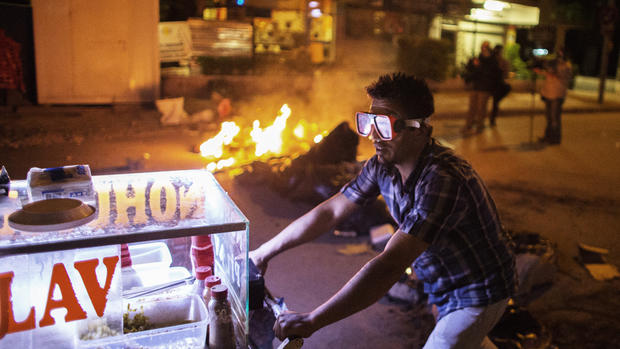Turkish PM urges protesters to leave Gezi Park
ANKARA, Turkey Turkey's prime minister on Friday urged a small delegation of protesters to persuade hundreds of others occupying an Istanbul park to withdraw.
Turkish activists leading a sit-in were considering a promise by Recep Tayyip Erdogan to let the courts and a potential referendum decide the fate of the much-despised Gezi Park redevelopment project — a plan that has sparked Turkey's biggest protests in decades.
The pledge was made during last-ditch negotiations after Erdogan had issued what he called a "final warning" to protesters.
- No clear result after Turkish PM, protesters meet
- Turkish government proposes referendum to end protests
- Turkish lawyers join the protest fray, angry at rough treatment
The two-week standoff has damaged Erdogan's international reputation and led to repeated interventions by riot police.
After initially inflaming tensions by dubbing the protesters "terrorists," the prime minister has moderated his stance in closed-door talks in the last few days.
But Erdogan told party members Friday that the protesters in the park had "stayed long enough."
"'Go and speak to them ... Don't let us be forced into reverting to different measures,"' Erdogan said he had told the protesters' representatives.
Earlier in the day, Erdogan's ruling party announced that the government would suspend its plan to cut down trees in Gezi Park and install a replica Ottoman barracks until the courts could rule on its legality. And even if the courts sided with the government, a city referendum would be held to determine the plan's fate, officials said.
It remained far from clear, however, whether the overtures would work.
Erdogan has pledged to end the two-week protest but has also urged his supporters to rally in Ankara and Istanbul this weekend.
Those demonstrations could raise tension between his conservative, Islamic base and the people occupying the park who are mostly — but not all — liberal- and secular-minded.
As night fell Friday, a festive mood pervaded the park, and the crowd of thousands swelled. Many sang songs or snapped photos of makeshift barricades erected by protesters.
The Taksim Solidarity group, two of whose members were in the meeting with Erdogan, has emerged as the most high-profile from the occupation that began last month.
But it does not speak for all of the hundreds camping in the park, many of whom claim no affiliation to any group.
Bilge Seckin, a member of the umbrella group, said discussions in the park about Erdogan's initiative were continuing, but she sensed "the general feeling is that the people's requests were not addressed" during the talks with the prime minister.
"For instance on the police violence, there were requests that senior officials responsible be removed from duty," she said, referring to the protesters demands. "They (authorities) are saying that police officers are being investigated — which is not very satisfactory."
It was not clear when, or if, the protest groups would make a formal response to Erdogan's initiative.
Many protesters were still seething at how a peaceful protest has been sometimes overtaken as riot police clashed with groups of stone- and firebomb-throwing youths.
Such scenes prompted the European Parliament to condemn the heavy-handed response by Turkish police.
A May 31 police raid to clear out the park ignited demonstrations that morphed into broader protests against what many see as the prime minister's increasingly authoritarian style of government.
Erdogan's opponents have grown increasingly suspicious about what they call a gradual erosion of freedoms and secular Turkish values under his Islamic-rooted party's government.
It has passed new restrictions on alcohol and attempted but dropped a plan to limit women's access to abortion.
Mobilizing the courts and a referendum, however, could shield the prime minister from accusations of an authoritarian response.
"Until the courts give their final verdicts, no action will be taken regarding Gezi Park," said Huseyin Celik, a spokesman for Erdogan's Justice and Development Party, after the meeting.
"Even if the court ... is in favor of our government's decisions, our government will hold a referendum to see what our people think — what they want and don't want."
Tayfun Kahraman, one of the Taksim Solidarity members who attended the meeting, said he believed Erdogan had offered "positive words," and that fellow activists would consider them in a "positive manner."
But he said those in Gezi Park would "make their own assessments."
"We are Gezi Park and we decide. No one has the luxury to decide on our behalf," he said.
Suspicion within the park about Erdogan's tactics and motives remains widespread.
"The prime minister calls the people he pleases to the meetings and says some stuff," said demonstrator Murat Tan. "We don't care about them much. Today, we saved the trees here but our main goal is to save the people."
Analysts say the protests don't present a threat to Erdogan's tenure, but do threaten his legacy.
Some say Erdogan would like to leave a mark on history, similar to that of Mustafa Kemal Ataturk, the founding father of modern Turkey.
Erdogan himself sat in front of a portrait of Ataturk during the overnight talks at his residence in Ankara.
